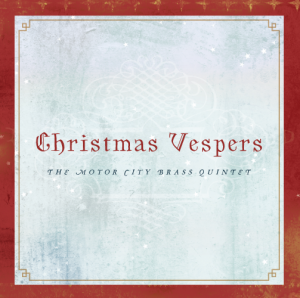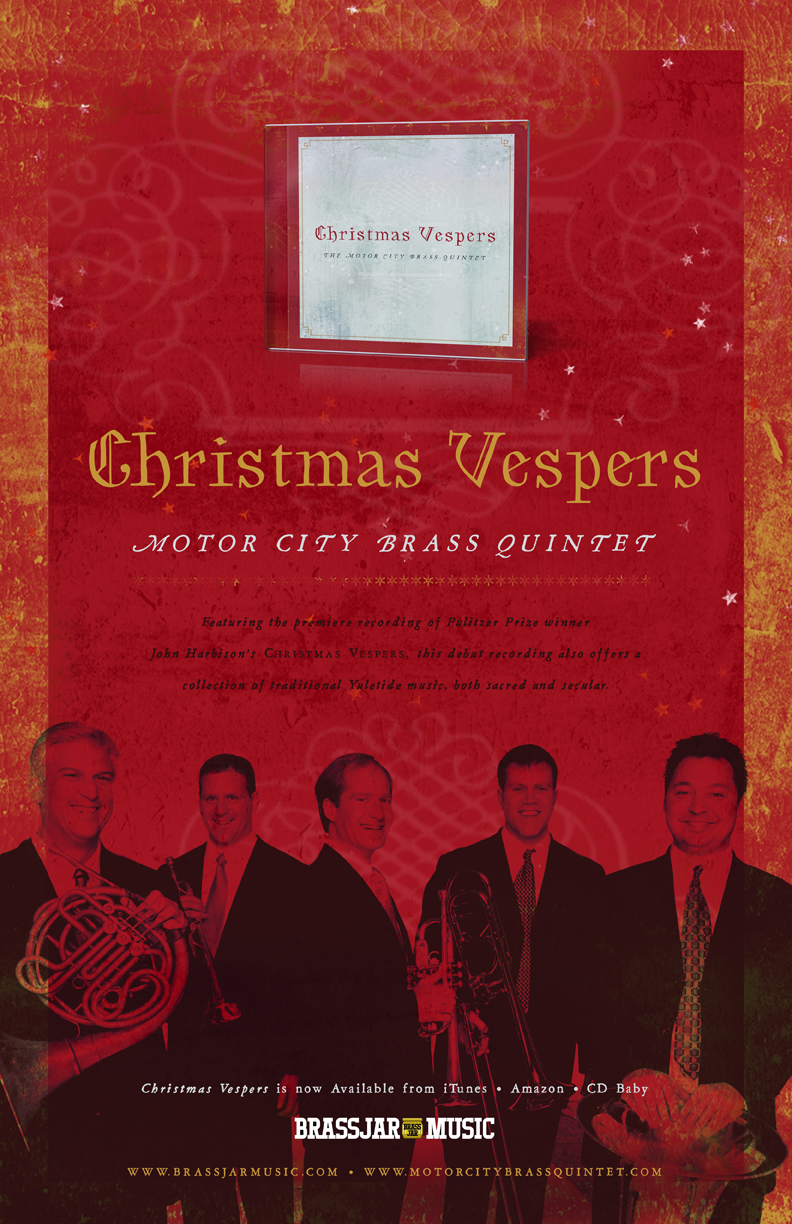Christmas Vespers

The Motor City Brass Quintet’s debut recording has been, to say the least, a long time coming—certainly (but not solely) in its artistic concept. As such, it has afforded the MCBQ a wealth of discovery along the way. Perhaps the most insightful artistic lesson can be summarized with a new adage, based on the age-old chicken-and-egg riddle: What comes first, the album or the arrangements? Well, both, we now say. This probably is no riddle, but rather a goal toward which we’ve dutifully trudged: find great quintet arrangements we love to play, and unify them in a narrowly-themed collection that stands in whole even greater than the sum of its wonderful parts.
And so we present our whole: Christmas Vespers; a collection of our favorite Yuletide music; and various tunes heard in assorted contexts each December, yet commonly programmed side-by-side, sacred and secular, in churches’ candle-lit musical celebrations of the Advent, the Vespers service.
McGregor’s lush carol arrangements evoke an all-congregation sing-along with booming pipe organ, and Hansinger’s Carol of the Bells imitates a handbell choir, echoing through the depths of an old, resonant church. The Herbert and Anderson favorites remind us of the children’s choir feature, while Handel’s great aria is the cantor’s (and house trumpeter’s) moment to shine. Subdued ancient European carols suggest choir-led meditations for moments of introspection, contrasting the brassy flair of Borngesser’s Joy. We might hum Gilliland’s tasteful arrangement of a warm modern classic as we head home in the cold night.
Of course, Vespers often features the Christmas pageant. The centerpiece of the MCBQ’s Vespers is the premiere complete recording of John Harbison’s Christmas Vespers (1988). Professor of Music at the Massachusetts Institute of Technology, Harbison is a recipient of the Pulitzer Prize and many other prestigious awards and commissions and has composed in virtually every genre, from solo to chamber to symphonic music. His Christmas Vespers: Brass Quintet reflects a Vespers service in itself, beginning with two seasonal chorale preludes as processionals, and concluding with a festive postlude based on the traditional Christmas song, “The Twelve Days of Christmas.” The main body of the piece, The Three Wise Men, alternates the familiar and beautiful narrative from Matthew 2:1–12 with elaborated “engravings” of each scene by the brass. The suite begins with a prelude depicting the long journey of the Wise Men, with its changing wide-open terrain and its optimistic, loping pace. The first lines of text, “Now when Jesus was born in Bethlehem . . . there came wise men,” draw a response from the brass, which sets the format for the suite as a whole.
The (Three) Wise Men are personified by Bb trumpet, horn and trombone, with an early medieval cast. Herod’s voice is spoken by the tuba. The plainsong-like motive of the Star and the Prophecies is introduced by, and later associated with, the higher-pitched C trumpet. Each ensuing scene is an enactment of the text pronounced, ending with a postlude, the reflective departing journey (a deliberate tip of the hat to the master of this kind of “music-for-use,” Paul Hindemith). In sum, it is a wonderfully unique composition that we believe deserves a prominent place in brass quintet repertoire.
We hope you enjoy our Vespers! Reflect on its parts, and incorporate it into a whole new Vespers of your own. Listen in random order, or in one of your own choosing. Celebrate the individuality of your Vespers service! We are humbly privileged to offer this refreshing new outlet with which you can enjoy the spirit and traditions of the season.


